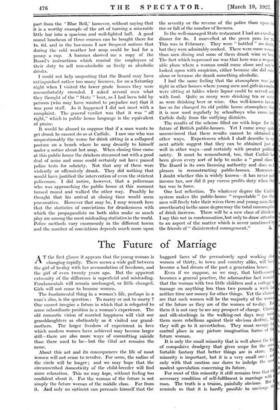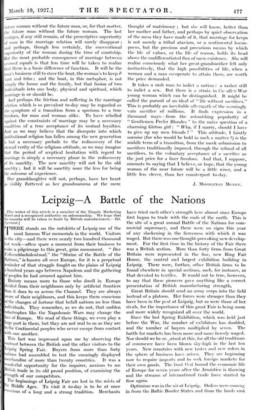The Future of Marriage
AT the first glance it appears that the young woman is changing rapidly. There seems a wide gulf between the girl of to-day with her accumulation of freedoms, and the girl of even twenty years ago. But the apparent extremity of the difference is superficial and misleading. Fundamentals will remain unchanged, or little changed. Girls will not cease to become women.
The fundamental thing in a woman's life, perhaps in a man's also, is the question : To marry or not to marry ? One cannot imagine a future in which that is relegated to some subordinate position in a woman's experience. The old romantic vision of married happiness will visit our granddaughters as obstinately as it visited our grand- Mothers. The larger freedom of experiment in love which modern women have achieved may become larger still—there are also more ways of committing suicide than there used to be—but the vital act remains the same.
About this act and its consequences the life of most omed will not cease to revolve. For some, the radius of the circle will be longer ; and we may hope that the circumscribed domesticity of the child-breeder will find Some relaxation. This we may hope, without feeling too confident about it. For the woman of the future is not simply the future woman of the middle class. Far from it. And only an optimist can persuade himself that the haggard faces of the prematurely aged working el women of thirty, in town and country alike, will liar become a bad dream of the past a generation hence.
Even if we suppose, as we may, that birth-cant becomes a general practice, the adamantine fact remai that the woman with two little children and a cottage manage on anything less than two pounds a week 11 neither time nor money for other things. Yet the chant' arc that such women will be the majority of the wonte of the future as they are of the women of to-day. 1'0 them it is not easy to see any prospect of change. Cinen and silk-stockings in the walking-out days may mak them more rebellious against their obvious destiny, bu they will go to it nevertheless. They must occupy tl, central place in any picture imagination, forms of t future woman. It is only the small minority that is well above the lur of compulsive drudgery that gives scope for the all fortable fantasy that better things are in store. T minority is important, but it is. a very small one ; an only with that caution one dares to indulge tine modest speculation concerning its future. For most of this minority it still remains true that tl necessary condition of self-fulfilment is marriage with man. The truth is a truism, painfully obvious. But reminds us that it is hardly possible to envisage Suture woman without the future man, or, for that matter, the future man without the fUture woman. The last vestiges, if any still remain, of the prescriptive superiority of man in the marriage relation will surely disappear ; and perhaps, though less certainly, the conventional superiority of the woman during the time of courtship. But the most probable consequence of marriage between avowed equals is that less time will be taken to realize that there is a basic difference of function. It will be the man's business still to steer the boat, the woman's to keep it taut and trim ; and the boat, in this metaphor, is not simply the house and the family, but that fusion of two individuals into one body, physical and spiritual, which marriage is or should be. - And perhaps the friction and suffering in the marriage relation which is so prevalent to-day may be regarded as the symptom of a transition from a spurious to a true freedom, for man and woman alike. To have rebelled against the constraints of marriage may he a necessary condition of a true acceptance of its mutual loyalties. Just as we may believe that the disrepute into which institutional religion has fallen among the new generation i but a necessary prelude to the rediscovery of the eternal verity of the religious attitude, so we may imagine that the period of sceptical hesitation with regard to marriage is simply a necessary phase in the rediscovery of its sanctity . The new sanctity will not be the old sanctity ; but it will be sanctity none the less for being the outcome of experience.
Our granddaughter will not, perhaps, have her heart visibly fluttered as her grandmamma at the mere thought of matrimony ; but she will know, better than her mother and father, and perhaps by quiet observation of the mess they have made of it, that marriage for keeps is not merely a tribal atavism, or a sentimental hocus- pocus, but the precious and precarious means by which the life of values, or the life of reason, holds its head above the undifferentiated flux of mere existence. She will realize consciously what her great-grandmother felt only instinctively, that the high possibilities of life, when a woman and a man co-operate to attain them, are worth the price demanded.
It takes a rash man to indict a nation ; a rasher still to indict a sex. But there is a strain in the after-War young woman which can be distinguished. It might be called the pursuit of an ideal of " life without sacrifices." This is probably an inevitable aftermath of the seemingly vain sacrifice of millions. It finds expression in a thousand ways—from the astonishing popularity of " Gentlemen Prefer Blondes " to the naïve question of a charming Girton girl : " Why, if I marry, should I have to give up my men friends ? " This attitude, I faintly surmise (for who would be bold in such a matter ?) is the middle term of a transition, from the meek submission to sacrifices traditionally imposed, through the refusal of all sacrifices, to the voluntary acceptance of a sacrifice as the just price for a finer freedom. And that, I suppose, amounts to saying that I belieVe, or hOpe, that the young woman of the near future will be a little wiser, and a little less clever, than her counterpart to-day.
J. MIDDLETON MURRY.































































 Previous page
Previous page